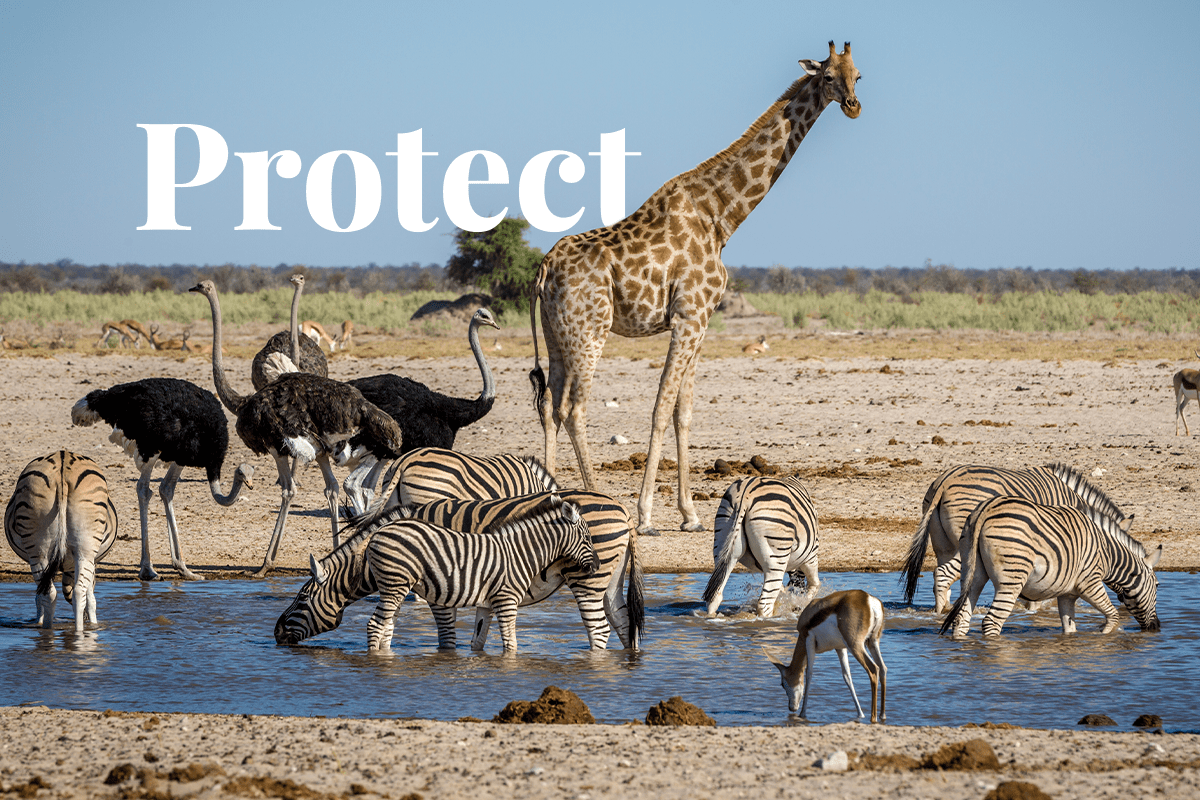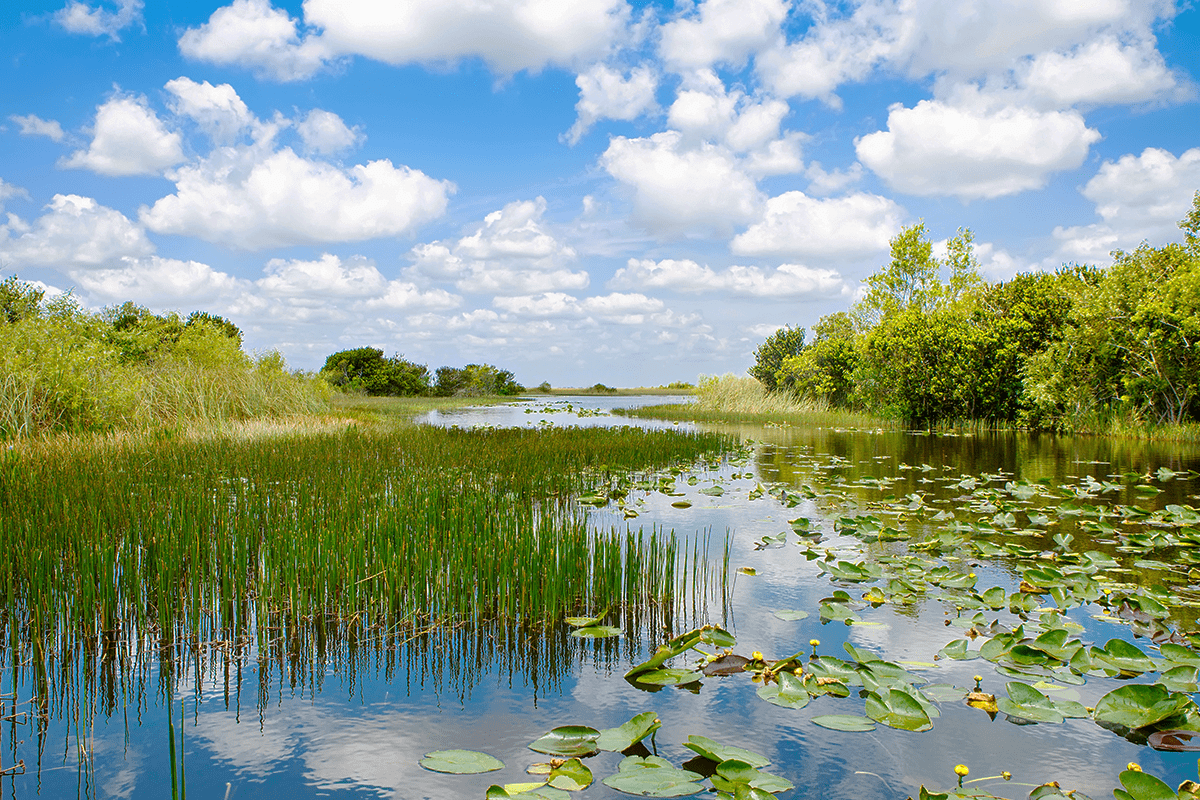Water is a precious resource essential for all life forms on Earth. From the tiniest microorganisms to the largest mammals, water is the elixir that sustains life. It is nature's liquid gold, a finite resource that is vital for the survival and wellbeing of our planet and its inhabitants.
 Animals drinking water in a waterhole inside the Etosha National Park, Namibia, Africa.
Animals drinking water in a waterhole inside the Etosha National Park, Namibia, Africa.
In today's world, water scarcity is a growing concern. Even though 71% of the Earth's surface is covered in water, only a fraction thereof is fresh water, and even less is readily available for human consumption. With increasing population growth and industrialisation, water demand is escalating while supply is diminishing. This makes water conservation crucial to ensure a sustainable future for our planet.
Water and biodiversity: a delicate dance
Water plays a pivotal role in supporting biodiversity, the web of life on Earth. Wetlands, rivers, lakes, and oceans are teeming with diverse species of plants and animals, creating complex ecosystems that are interconnected and interdependent. These ecosystems support the delicate balance of nature and provide habitat for various species, including many endangered and rare species.
However, the depletion of water resources has severe consequences on biodiversity. Drying rivers, shrinking wetlands, and vanishing lakes disrupt the natural habitats of many species, pushing them towards extinction. For instance, the Aral Sea in Central Asia, once the fourth largest lake in the world, has lost over 90% of its water volume, leading to the extinction of numerous species of fish and birds that depended on it. Water scarcity also exacerbates pollution and habitat destruction, threatening the survival of many species, including migratory birds, amphibians, and marine life.
Saving water is thus not only about ensuring human survival but also about safeguarding the rich biodiversity on our planet. It is about the responsibility to protect the countless species that share this planet with us.
Read more: The shrinking of the Dead Sea
Water and ecosystem services: nature's precious gift
Ecosystem services refer to the benefits nature provides to humans, including the provision of water. For example, nature acts as a natural water purification system, filtering and cleansing water as it flows through forests, wetlands, and other ecosystems. Healthy ecosystems also help regulate water flow, preventing floods during heavy rainfall and ensuring water availability during dry periods.
Read more: 10 Vital ecosystem services: sustaining life on Earth
However, human activities such as deforestation, pollution, and habitat destruction threaten ecosystems' ability to provide these vital services. Deforestation reduces forests' natural water filtration capacity, leading to increased sedimentation, pollution, and reduced water quality. Wetlands, which act as natural sponges and absorb excess water during floods, are drained for agriculture and development, disrupting their natural functions. These activities degrade ecosystems and disrupt the delicate balance of water availability and quality, impacting human societies and economies.
Read more: The importance of trees in water conservation
 Wetlands, Florida.
Wetlands, Florida.
By saving water, we are not only protecting the quantity and quality of water available for human use but also safeguarding nature's ability to provide invaluable ecosystem services. It's a precious gift from nature that we cannot afford to lose.
Read more: Why are tropical rainforests important?
The economics of water conservation
Water conservation is environmentally responsible and economically beneficial. The cost of water extraction, treatment, and distribution is increasing due to the declining availability of fresh water and the need for advanced treatment methods. By conserving water, we can reduce water demand and lower the costs associated with its extraction, treatment, and distribution.
Water conservation can also have positive economic impacts on industries such as agriculture and tourism, which rely heavily on water resources. Efficient irrigation practices, water recycling, and water use reduction strategies can help farmers save water, reduce costs, and increase their resilience to droughts. Similarly, preserving natural water bodies and ecosystems, such as lakes, rivers, and wetlands, could benefit the tourism industry, generating revenue and employment opportunities.
Moreover, water scarcity can lead to conflicts and disputes over water resources, which have significant economic and social consequences. By conserving water, we help prevent conflicts and promote cooperation, ensuring a stable and sustainable water supply for more communities and businesses.
Read more: 10 Agricultural techniques for water conservation
Water conservation starts at home
Water conservation is not solely the responsibility of governments and industries; it starts at home. Simple changes in our daily habits can make a significant impact on saving water and protecting nature's liquid gold.
Here are some practical tips for conserving water at home:
- Fix leaks promptly: A dripping faucet or leaky toilet can waste litres of water daily. Fix leaks as soon as possible to prevent unnecessary water wastage.
- Use water-efficient appliances: Install water-efficient showerheads, faucets, and toilets to reduce water usage.
- Be mindful of water usage: Turn off the tap while brushing your teeth, washing your hands, or doing dishes. Collect and reuse rainwater for watering plants and gardens.
- Opt for native and drought-resistant plants: Plant native plants in the garden, as they are adapted to the local climate and require less water. Use mulch to retain moisture and reduce evaporation.
- Use the dishwasher and washing machine efficiently: Wait until there is a full load before using the dishwasher or washing machine, and use eco-friendly settings to save water.
- Stay informed and inform others: Stay informed about local water issues and about the importance of water conservation. Encourage your friends, family, and community to adopt water-saving practices.
 Lavender flowers blooming in the garden.
Lavender flowers blooming in the garden.
Read more: How to reduce your carbon footprint and help the environment
The ripple effect of saving water
The importance of water conservation goes beyond protecting nature. It has a ripple effect on various aspects of our lives, including health, economy, and social wellbeing.
Water scarcity has economic implications. Agriculture, which accounts for the largest share of global water usage, relies heavily on water availability for crop production. Water scarcity leads to crop failures, reduced agricultural productivity, and loss of livelihoods for farmers, which can have ripple effects on food prices, trade, and economic stability. Industries that depend on water for their operations, such as food processing, textiles, and energy production, may also face disruptions, leading to economic losses and job insecurity.
Moreover, water scarcity can have social impacts, exacerbating inequalities and conflicts. In many parts of the world, access to water is unevenly distributed, with some communities often facing water scarcity and inadequate water services. This can lead to social tensions, displacement of people, and conflicts over water resources, further destabilising communities and regions.
By saving water, we mitigate these negative impacts and create a positive ripple effect. Conserving water helps protect nature and biodiversity, promotes human health, sustains economies, and fosters social wellbeing.
DGB's green mission: conserving water through reforestation
As a company dedicated to large-scale reforestation projects, we understand the intrinsic link between water conservation and the wellbeing of nature and humanity. Water is a precious resource that sustains all life on Earth. Its conservation is essential for the survival and prosperity of both nature and humanity. By protecting and restoring forests, which serve as natural water filters, regulators of water cycles, and biodiversity guardians, we are not only safeguarding water resources but also creating a sustainable future for ourselves and future generations.
Nature and humans are intertwined. Our prosperity is interconnected with the health and vitality of our natural ecosystems. When nature thrives, we benefit too. Forests provide water and numerous ecosystem services vital for our wellbeing, such as clean air, food, medicine, and recreational opportunities. Healthy forests support livelihoods for millions of people, especially in rural communities depending on forests for subsistence and income.
DGB Group, we recognise that saving water is fundamental to our mission. By restoring and protecting forests, we are conserving water and contributing to the overall health and prosperity of nature and humanity. We believe that nature holds the key to a sustainable future, and by working in harmony with it, we can create a better world for ourselves and future generations.
Be part of the change: contact our experts



